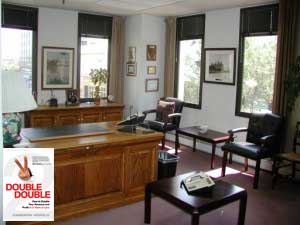 I am writing today to report the untimely death of the private office. This isn’t a time for mourning, it had a good run. For a while there, a private office was looked at as the pinnacle of career success; the carrot that motivated countless company drones as they clutched and crawled up the corporate ladder.
I am writing today to report the untimely death of the private office. This isn’t a time for mourning, it had a good run. For a while there, a private office was looked at as the pinnacle of career success; the carrot that motivated countless company drones as they clutched and crawled up the corporate ladder.
But if you want to build the kind of culture that allows companies to flourish, you need to dig a grave for the private office. Nearly every company that I’ve been a part of or advised as a consultant has adopted an open concept office environment.
At 1-800-GOT-JUNK?, we had three floors of wide-open space. It certainly turned the heads of visitors, but our employees loved it. We saw better communication, better teamwork, better morale and faster learning.
In fact, we were once forced to move into traditional office while a new space was being constructed. At first, staff reveled in their new private offices and the workspace hummed with the quiet of focused work. But slowly, people began to see the shortcomings of these walls. They missed the collaboration, longed for the camaraderie and grew sick of the silence and white noise. After just a few weeks, everyone was in unanimous agreement; private offices sucked and were sucking the buzz out of their jobs.
Private offices throw up physical walls between team members. A conversation that could take seconds in an open-concept environment gets needlessly stretched into minutes by walls and doors. It might sound like a minor inconvenience, but multiply that inconvenience by dozens per day, per year and the waste is staggering.
Of course, it isn’t just physical walls they erect, either—the metaphoric barriers private offices create are undeniable. The lowly cubicle dwellers will inevitably feel resentment toward the office crowd. And all the jockeying, scheming and positioning they’ll do to get in that corner office is energy much better used towards growing your business.
I admit, getting rid of private offices is a tough sell to some clients. Senior executives cry foul at the loss of privacy. “I deal with sensitive information!” some say. “I make important phone calls” or “What happens when I meet with high level clients?” ask others. “That’s what the boardroom is for”, I retort. Really, what they are saying is “Please don’t take away the office I worked so hard to achieve.”
But almost to a man (or woman) they come back after trying out a few weeks outside their walls and they rave about it. They feel rejuvenated, more connected to their employees, and most importantly, have a much better feel for the direction of their company.
For more information on this topic, check out: Building a World Class Culture.




